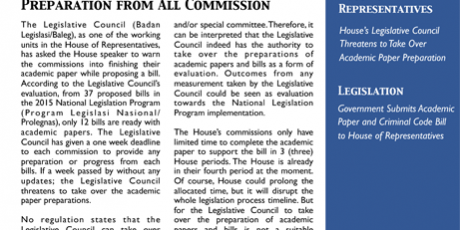- House’s Legislative Council Threatens to Take Over Academic Paper Preparation from All Commission
- Government Submits Academic Paper and Criminal Code Bill to House of Representatives
House of Representatives
House’s Legislative Council Threatens to Take Over Academic Paper Preparation from All Commission
The Legislative Council (Badan Legislasi/Baleg), as one of the working units in the House of Representatives, has asked the House speaker to warn the commissions into finishing their academic paper while proposing a bill. According to the Legislative Council’s evaluation, from 37 proposed bills in the 2015 National Legislation Program (Program Legislasi Nasional/Prolegnas), only 12 bills are ready with academic papers. The Legislative Council has given a one week deadline to each commission to provide any preparation or progress from each bills. If a week passed by without any updates; the Legislative Council threatens to take over the academic paper preparations.
No regulation states that the Legislative Council can take over academic paper and bill preparations from the commission. However, according to Article 105 paragraph (1) letter h from Law No. 17 Year 2014 Act N0. 17 2014 stipulates that one of the Legislative Council’s duty is to follow the progress and to evaluate the discussion content of any bill in coordination with the commission and/or special committee. Therefore, it can be interpreted that the Legislative Council indeed has the authority to take over the preparations of academic papers and bills as a form of evaluation. Outcomes from any measurement taken by the Legislative Council could be seen as evaluation towards the National Legislation Program implementation.
The House’s commissions only have limited time to complete the academic paper to support the bill in 3 (three) House periods. The House is already in their fourth period at the moment. Of course, House could prolong the allocated time, but it will disrupt the whole legislation process timeline. But for the Legislative Council to take over the preparation of academic papers and bills is not a suitable solution in achieving the National Legislation Program target. One should consider that such an initiative would not give sufficient solution, since the whole legislation process should be initiated from the early stages; from the discussion phase during the early days of law-making design. (RW)
Legislation
Government Submits Academic Paper and Criminal Code Bill to House of Representatives
The legislation process of the Criminal Code Bill (Rancangan KUHP/RKUHP) has entered a new phase. President Joko Widodo has issued Presidential Letter related to the discussion for the 2015 Criminal Code Bill. The letter was then followed by the submission of the Criminal Code Bill draft and academic paper by the Government to the House, along with the Bill on Brands and Bill on Patents. This initiative has reopened the discussion of the Criminal Code Bill between Commission III and the Government. The Criminal Code itself has undergone decades of discourse; beginning from the National Law Seminar, which took place in Semarang in 1963, which gave recommendations on the Criminal Code reform.
After the 1963 seminar, drafting of the Criminal Code Bill began in the following year. The Criminal Code Bill drafting was done using the codification method. The codification method is interpreted as the systematical preparation and adoption of rules in the book of the law on broad legal field. The Dutch Criminal Code or Wetboek van Straftrecht (WvS), the US Code Title 18 about Crimes and Criminal Procedure in the United States, and the Penal Code in France are a few examples of codification of the criminal law. The Criminal Code in Indonesia has also used this method. The process of rule-making codification requires a long time and the results could be the output of out-of-date laws. It is considered difficult to make changes since while codifying the criminal code. Although the method of codification could slow matters in legal reform context , but on the subject of criminal law, codification is important because it has the mechanism required for development of a national law.
While formulating the Criminal Code Bill, the Government approach in choosing closed or full codification is being criticized by a number of activists of the Criminal Code Reform. At the moment, the Government has the intention of going with the closed codification method used in the making of the Criminal Code. The Government wants to cover the entire article on felony, which already exists in various laws. But on the other hand, the Government is also encouraging the birth of new felonies in a number of bills outside the Criminal Code. Others have criticized that during the discussion process in the previous House session, the time allocated for discussion was insufficient. Also, it should be noted that no consensus was reached between legislators and the Government during last House’s period on any topic. Based on this, the civil society considers that there should be a change of method in discussing the Criminal Code Bill between legislators and the Government.
The civil society proposed for future bill discussion during House sessions, the discussion should be arranged into clusters of topics. The clustering method will prevent the discussion being consumed by debates on semantics, which always been the issue in the discussion method using the Problem Inventory List (Daftar Inventaris Masalah/DIM). The next adjustment proposed by the civil society is that members of Commission III of the House of Representatives who are also members of the Criminal Code Special Committee should not be included in other bill discussions. Equally important, the public should be involved in discussing the Criminal Code Bill. The hundreds of articles of the Criminal Code and sluggish discussions during House’s previous period should be concerning enough by both the Committee members and the Government. The expectation is that the Bill could answer the national demand on a comprehensive and systematically formulated Criminal Code. (ED)

